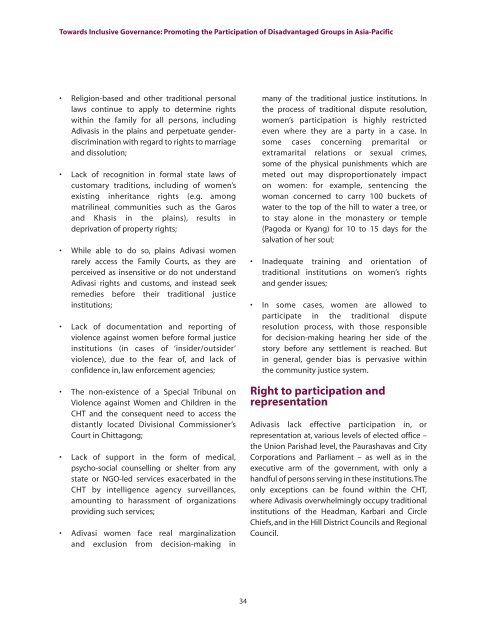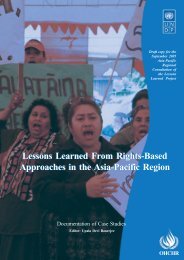View / Download - HRBA Portal
View / Download - HRBA Portal
View / Download - HRBA Portal
Create successful ePaper yourself
Turn your PDF publications into a flip-book with our unique Google optimized e-Paper software.
Towards Inclusive Governance: Promoting the Participation of Disadvantaged Groups in Asia-Pacific• Religion-based and other traditional personallaws continue to apply to determine rightswithin the family for all persons, includingAdivasis in the plains and perpetuate genderdiscriminationwith regard to rights to marriageand dissolution;• Lack of recognition in formal state laws ofcustomary traditions, including of women’sexisting inheritance rights (e.g. amongmatrilineal communities such as the Garosand Khasis in the plains), results indeprivation of property rights;• While able to do so, plains Adivasi womenrarely access the Family Courts, as they areperceived as insensitive or do not understandAdivasi rights and customs, and instead seekremedies before their traditional justiceinstitutions;• Lack of documentation and reporting ofviolence against women before formal justiceinstitutions (in cases of ‘insider/outsider’violence), due to the fear of, and lack ofconfidence in, law enforcement agencies;• The non-existence of a Special Tribunal onViolence against Women and Children in theCHT and the consequent need to access thedistantly located Divisional Commissioner’sCourt in Chittagong;• Lack of support in the form of medical,psycho-social counselling or shelter from anystate or NGO-led services exacerbated in theCHT by intelligence agency surveillances,amounting to harassment of organizationsproviding such services;• Adivasi women face real marginalizationand exclusion from decision-making inmany of the traditional justice institutions. Inthe process of traditional dispute resolution,women’s participation is highly restrictedeven where they are a party in a case. Insome cases concerning premarital orextramarital relations or sexual crimes,some of the physical punishments which aremeted out may disproportionately impacton women: for example, sentencing thewoman concerned to carry 100 buckets ofwater to the top of the hill to water a tree, orto stay alone in the monastery or temple(Pagoda or Kyang) for 10 to 15 days for thesalvation of her soul;• Inadequate training and orientation oftraditional institutions on women’s rightsand gender issues;• In some cases, women are allowed toparticipate in the traditional disputeresolution process, with those responsiblefor decision-making hearing her side of thestory before any settlement is reached. Butin general, gender bias is pervasive withinthe community justice system.Right to participation andrepresentationAdivasis lack effective participation in, orrepresentation at, various levels of elected office –the Union Parishad level, the Paurashavas and CityCorporations and Parliament – as well as in theexecutive arm of the government, with only ahandful of persons serving in these institutions.Theonly exceptions can be found within the CHT,where Adivasis overwhelmingly occupy traditionalinstitutions of the Headman, Karbari and CircleChiefs, and in the Hill District Councils and RegionalCouncil.34



